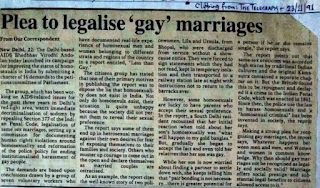Courtesy: Pravartak Isssue No. 1 (2.12 - 15.12.91)
While
rejecting the prayer for same-sex marriage the Supreme Court of India through
its judgements made the following points:
1. This
court cannot legislate.
2. There
is no fundamental right to marry.
3. This
judgement has not touched the Special Marriage Act and all personal (religious)
laws.
4. Split
opinion on adoption by same-sex couples.
5. Transgender
can marry.*
This
Supreme Court judgement on same-sex marriage does not change the ground
situation at all till the Parliament brings a legislation. Same-sex marriages
were taking place in India for a long long time and have been documented
extensively in the 1980s and 1990s. Same-sex marriages will continue to take
place in future as well. Same-sex couples certainly do not need this SC
judgement to take the leap. Effectively the SC has taken the LQBTQIA community
for a long ride by building up hopes but without delivering the needed marriage
equality for the simple reason that the judiciary does not have the mandate to
legislate. These are matters to be debated and decided upon by the legislature.
Halfway through the final arguments the constitution bench judges realised
their folly and even confessed that it is for the Parliament to make a law on
the issue!!! It was a pathetic sight indeed then to see lawyers plead for
peripheral issues like same-sex couples being allowed joint bank accounts etc! The
Court then went on to request the Solicitor General to come forward with what
the government would do for welfarism of same-sex couples.
Another
negative of this judgement is that it has effectively subverted ongoing efforts
viz campaign, movement for same-sex marriage. Besides, the tempo will have to
be built up all over again. Street level protest politics will have to be
started anew and it will have to be a long drawn out struggle with lots of
sacrifices.
ABVA’s
Role
ABVA
had made the demand for same-sex marriage in 1991 through its path breaking
report - ‘Less
than Gay’. This report detailed same-sex marriages in India in the
1970s and 1980s. In 1999 ABVA documented the attempted suicide of a lesbian
couple in Orissa through its report titled ‘For
People Like Us’. ABVA made the demand before any
country in the whole world had legalised same-sex marriage. ABVA has been
petitioning since 1991 for legislation on same-sex marriage. The SC took up the
issue 32 years later but as expected failed to deliver.
Much
Ado About Nothing
This
academic exercise undertaken by the SC has provided free publicity (live
telecast proceedings for days) to the foreign funded NGOs; foreign funded PIL
lawyers; the judges who were able to hog the limelight; and Gay & lesbian
people who had deserted the LGBTQIA community by leaving India for greener
pastures abroad and dramatically reappeared in the 21st century at
the Supreme Court of India to get their same-sex marriage with foreign spouses
legalised through the ongoing cases. Thus they piggy rode on genuine
petitioners. In fact halfway through the final arguments the judges made it
clear that they are not amending the Foreign Marriage Act. Considerable court
time got wasted because of such petitions.
ABVA
in May 2023 had opined that the LGBTQIA community should withdraw the cases
from the court. We wrote:
“If these 5 judges of the constitution
bench declare in their judgement that Parliament alone can legislate on
same-sex marriage, it will create a problem for future generations (again the
section which opts for judicial route rather than parliament for their
liberation) who will then have to ensure a larger bench of more than 5 judges
to reverse the judgement awaited in the present case. A Herculean task indeed!
In such a scenario withdrawing cases
from the court is a tactical retreat dictated by one’s conscience and wisdom;
then at least the petitioners and their lawyers will come out with their
self-respect and dignity intact and their heads held high.”
Shobha
Aggarwal
On
behalf of AIDS Bhedbhav Virodhi Andolan Collective
Blog:
http://aidsbhedbhavvirodhiandolan.blogspot.com/
*
Madras High Court in 2019 has already ruled that a man and a transgender woman can marry.

No comments:
Post a Comment